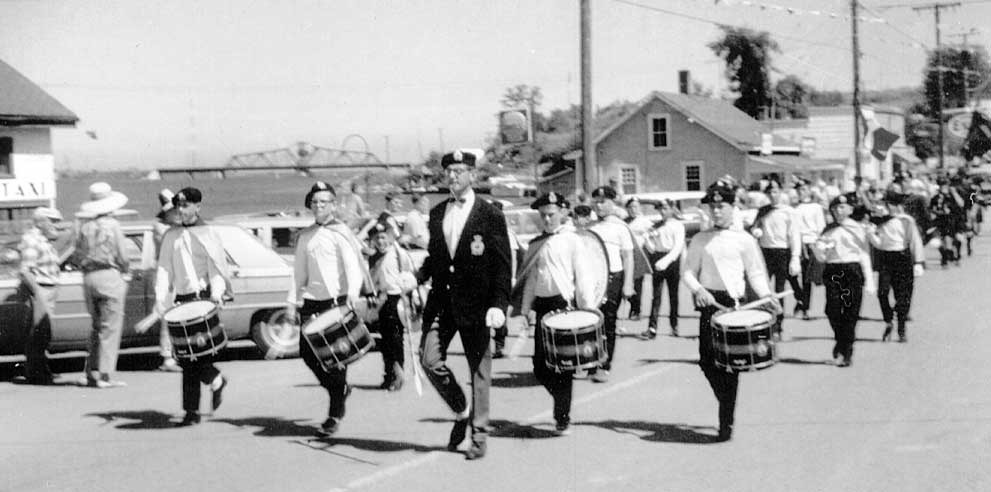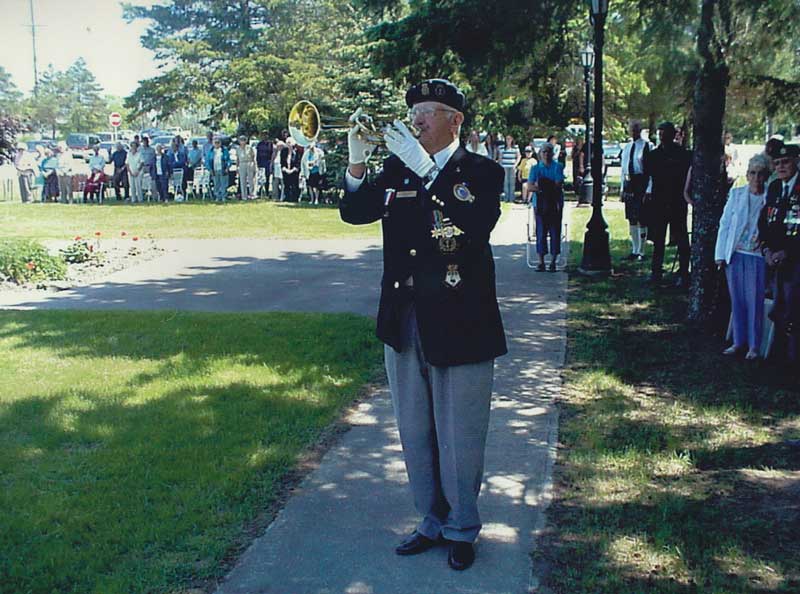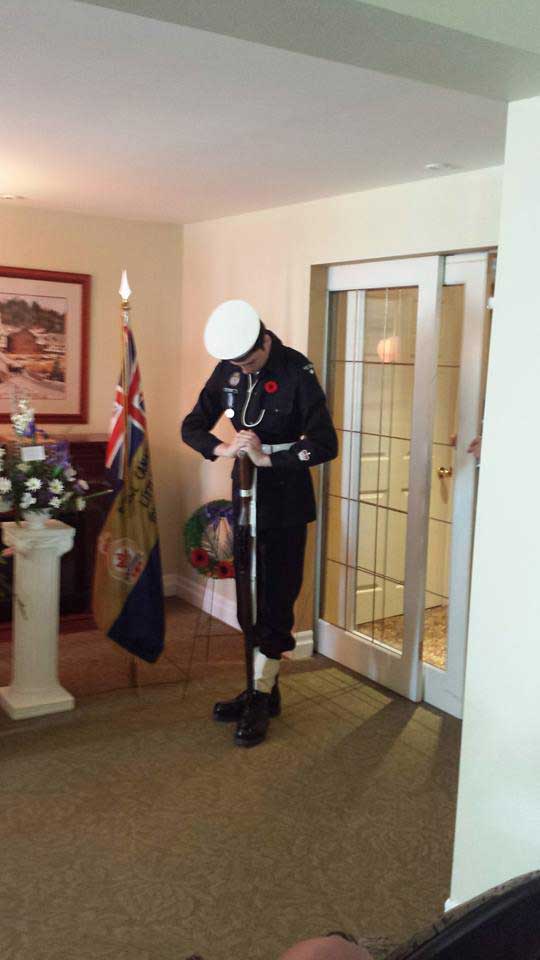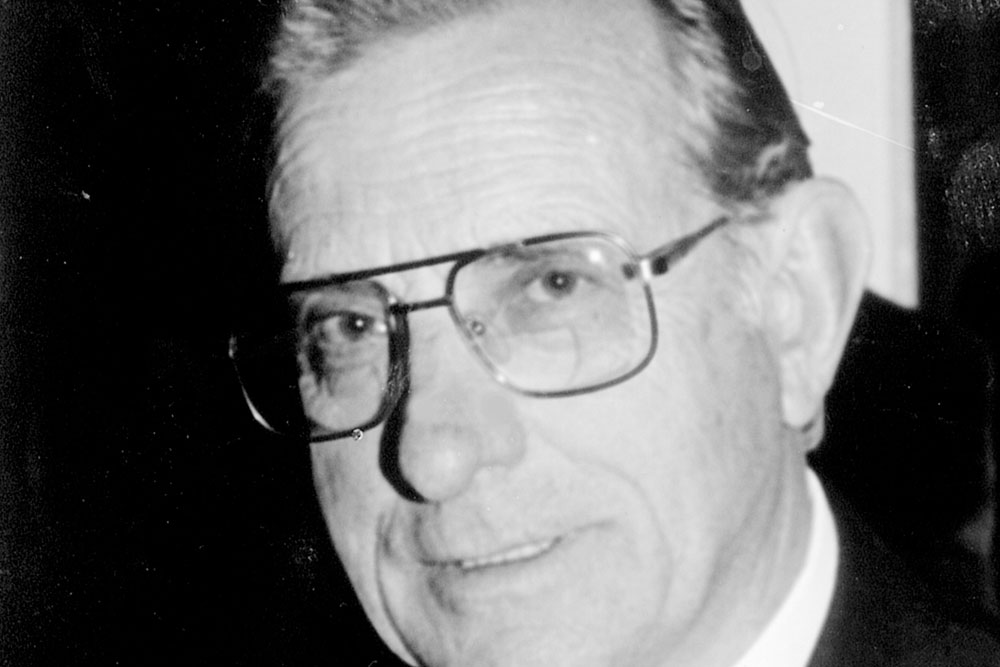A calm steady hand at the helm
by Michael Erskine (with files from Petra Wall)
There is no place you cannot go if you keep a firm hand on the tiller and your eye on the horizon. The Manitoulin Island community said goodbye to one of their most steadfast pilots last week, as Edwin (Ed) Arthur Kift passed away following a courageous battle.
Mr. Kift was born on the kitchen table, with the help of a mid-wife, in Weston, Toronto’s western reaches, on November 22, 1925. “The light was likely better in the kitchen,” he surmised. “I remember my mother as a great cook and seamstress. She could study a dress in a shop window and then duplicate it without a pattern.”
Mr. Kift was born to English immigrants seeking a better life in the New World, but barely three years later his mother died on the cusp of the Great Depression. Mr. Kift’s father spent the dirty ‘30s unemployed, like many of his generation who experienced the depression years, and the tremendous hardship his family faced during that terrible period had an incredible impact on Mr. Kift’s future approach to life’s challenges.

“My sister Marjory quit school in Grade 7 and began to work in a restaurant for eight dollars a week,” he told The Expositor’s Now and Then columnist Petra Wall in describing that period of his life. “I found a job helping weed 40 acres of carrots and radishes in the Holland Marsh between Toronto and Barrie. At 12, I was earning 10 cents an hour.”
“My father had a profound love and respect for his sister Mary,” recalled Jason Kift, one of Mr. Kift’s three sons with his wife Judith (an older son David Thrall grew up with his previous wife in Toronto). “Mary basically raised him after his mother died. They were in the very throes of the Great Depression and they had nothing. For my dad, and his dad, she took over as mother, doing the cooking and washing.”
Mr. Kift moved through a series of manufacturing jobs as the dark clouds of the Great Depression gave way to the maelstrom of the Second World War, having a hand in building over one thousand of the most seminal of that conflict’s aircraft, the de Havilland Mosquito, before joining the Canadian Navy.
Mr. Kift had vivid memories of the Kamikaze planes attacking their convoy on May 4, 1945. “He had the most amazing memory for detail,” noted son John Kift, who recalled his father as a consummate storyteller.
“That was bogie bearing green 9-0. One Zero (the iconic Japanese fighter aircraft) came at us at ground level and our three guard planes quickly took up the chase,” he recalled for Ms. Wall. “As soon as they were out of sight four more Japanese planes attacked the convoy. The Zero planes were just too fast for us. We got hammered. We had two large aircraft carriers, the 740-foot HMS Formidable and HMS Victorious. The Formidable wound up with a large hole on both sides where the bomb had entered and gone right through. Debris from the exploding Zero hit the big ship and flames shot up 200 feet into the air.”

Mr. Kift was serving on Canada’s largest warship, the Uganda, a vessel with a reputation as a “pusser” (a ship with strict adherence to regulation, discipline and an iron-strict captain). He went aboard with eyes wide open, as his previous captain had warned of the Uganda’s reputation and having a friend already serving aboard her. In the action that day, Mr. Kift’s convoy lost 18 lives and twice as many wounded. The Uganda herself had lost one gun turret and Victorious had to transfer part of her own steel plate to Formidable to help patch the holes in her sides.
“He never celebrated VE Day, as he told me, the shooting stopped for those jammy bastards in Europe and the east coast,” said fellow North Shore Naval Veteran Bill Lee. “The Japanese were still shooting at me in the Pacific.” Mr. Kift was an active member of the Manitoulin Naval Veterans and later the North Shore Naval Veterans.
Mr. Lee recalled another anecdote from Mr. Kift in recalling his early days at sea. “The first time he was at sea and got sea sick he said ‘for about four days I thought I was going to die, then on the fifth I was afraid I wouldn’t’.”
Following the war in Toronto during the late 1940s, Mr. Kift joined the Second Armoured Divisional Signal Company Bugle Band. “We travelled all over Canada and the States, winning all competitions we entered,” recalled Mr. Kift. “Some of the places were Waterloo, New Jersey, and Detroit. Bob Hope was performing at the Detroit State Fair. He was so impressed with our version of ‘John Peel’ he came off the stage and hugged some of our band members.”
In 1960 Mr. Kift moved to a six-acre lot he had purchased in Sheguiandah. With the assistance of some financing from his brother-in-law, Jack Van Esterikhe, built the Sheguiandah Bay Village, boasting five cabins and joined the late Albert Rolston’s insurance and real estate business which became known as Rolston and Kift Real Estate.
Jason Kift said that he always marveled at his father’s work, overhearing many of the conversations his father had over the phone. The conversations often left their mark. “He took things very strongly,” he said. “His feelings were often hurt. I don’t think he really had a thick enough skin for that job.”
But Mr. Kift sailored on, showing his sons the meaning of that too oft quoted phrase “carry on” rather than simply telling them.
His first son, Ted, was born late in 1964 to be later be joined by Jason and John.
Mr. Kift’s community minded activities followed soon after. In 1967 he started a boys’ and girls’ bugle band with 20 boys and four girls.
“People would stream out of their homes when we marched down the street,” recalled Mr. Kift fondly. “The band proved to be a very successful venture despite having no financial help.” The marching band lasted for several years under the firm but gentle hand of Mr. Kift.
“I never heard him raise his voice,” said son Jason in wonderment. “Even though he was looking after 20 kids by himself.”
“He never did, you know,” agreed Mr. Kift’s close friend and oft-time partner in Legion work Jeff Marshall. “He had this way about him, if a young person was causing a problem, Ed would just take him quietly aside and let him know what it was he was doing wrong and how he could make it better.”
Mr. Marshall, whose late brother Ralph was also a close friend and fellow conspirator with Mr. Kift, helped out with the band project. They managed to convince the Royal Canadian Legion to pony up the funds to purchase an old school bus to help move the band members around to performances.
“They did it to help keep the kids off the street,” recalled Mr. Marshall. “It worked very well at doing that for many years.”
“I can attest to that,” said one-time band member Tom Smith. “I couldn’t admit it at the time, of course, but I was pretty proud to be there, marching through the streets with the band.”
By 1973, Mr. Kift was working full time in real estate purchasing a Cessna 150 to help with marketing. The small resort business folded with the cottages sold to individual buyers. The Kift family bought a furnished house beside the Catholic Church in Little Current.
Mr. Kift became the town’s fire chief, taking on the position following a substantial reorganization of the force. “They had decided to take a more professional approach to being a fire department,” recalled Manitoulin Publishing owner Rick McCutcheon. He obtained uniforms for the men and lobbied to get a Class ‘A’ pumper. “This was the first time the fire department had equipment like that,” said Mr. McCutcheon. “The men started taking courses and it really laid the foundations of the first class fire department Little Current has today.”
“We saved part of the old Hydro building in Kagawong from fire and we got $1,500 from the insurance company for keeping their costs down,” recalled Mr. Kift. “This money helped buy some new equipment for our fire department. Being a fireman was very rewarding but once I got into my 50s, I realized this was a young man’s job.”
Another project Mr. Kift sank his teeth into was the Manitoulin East Corporation. The company assisted Section 40 CMHC (Central Mortgage and Housing Corporation) clients in rural areas.
“He had heard about this program and decided that it was the kind of thing our community needed,” recalled Mr. McCutcheon. “He was really the driving force behind it.”
“We generated enough revenue and materials to build 15 homes in Little Current, Manitowaning, Providence Bay and Gore Bay,” recalled Mr. Kift later. “These homes were for people who did not have the funds to build them. Many of these were single mums.”
Mr. McCutcheon noted that the future owners banded together to help with the cleaning and painting, paying their down payments with labour or ‘sweat equity.’
Mr. Kift was also deeply immersed in the construction of Memorial Gardens, the District Cenotaph between Mindemoya and Providence Bay. He worked together with Allan Tustian, and the late Johnny Bryant and Ralph Marshall to make that project a reality.

service.
Among the greatest legacies Mr. Kift has left behind for the Manitoulin community is his role in founding the Manitoulin Sea Cadet Corps.
Despite his advancing years that point in his life, Mr. Kift was so taken with the positive impact of the cadet corps on youth that he was determined to bring that opportunity to the Island.
“I remember Ed came back from a meeting in Sudbury and dropped by my house,” said Mr. Marshall. “He said ‘we are going to start a sea cadet corps.’ I said ‘what do you mean we?’.”
By the time Mr. Kift left the Marshall household that evening, the die was cast and Mr. Marshall was fully committed to the cause.
“It was pretty hectic at the start,” admitted Mr. Marshall, recalling the first years travelling each week to Sudbury (where the sponsoring cadet corps was based). “Through it all Ed always remained calm. He never seemed to get upset or angry.” Mr. Kift just kept doggedly on course.
“There was never any pay for any of this,” noted Mr. Marshall. “The pay was in the thanks he got from the parents.” Mr. Marshall recalled the testimony of one parent. “He said that he always expected to one day be visiting his son in jail,” said Mr. Marshall. That young man went on to become one of the Manitoulin Sea Cadet Corps finest cadets, a serving member of the Canadian Forces and an upstanding member of society. “That is where the reward comes,” said Mr. Marshall.
Mr. Kift used his business contacts, in conjunction with Islander Mr. Marshall’s community contacts, to find numerous and innovative ways to raise the money needed to establish and maintain the cadet corps.
Through all of these activities, Mr. Kift also coached minor hockey and took a very active part in his children’s lives.
“We never really lacked for anything,” recalled Jason. “He went to every one of my hockey games. Looking back on it, for all the things he was involved in, being a parent now myself, I just don’t know how he managed it.”
His sons and friends all remarked on the close loving relationship Mr. Kift enjoyed with his wife Judy, someone he doted upon and with whom he shared an uncommonly close bond. Together the couple sang the Jim Reeve’s standard ‘The Only Good Thing That’s Happened To Me is You’ at his 80th birthday party. The performance might have been a little ragged (according to Mr. Kift himself), but the sentiment expressed between those life companions misted eyes throughout the room.
With a close group of local friends, the self-styled Dog Lake Boyz, Mr. Kift also found time to go on fishing trips to remote northern lakes and remained an avid cross country skier into his 80s.
How did Ed Kift manage his remarkable life of accomplishment and community service? His favourite saying might illuminate something of that.
“He rarely called us Ted, or John, or David, it was always Kift or pal,” recalled son John, “followed by ‘carry on’.”
Little Current and the Manitoulin community are better places for having known the calm steady hand and steeled understated determination of Mr. Kift. “Carry on, pal.”



